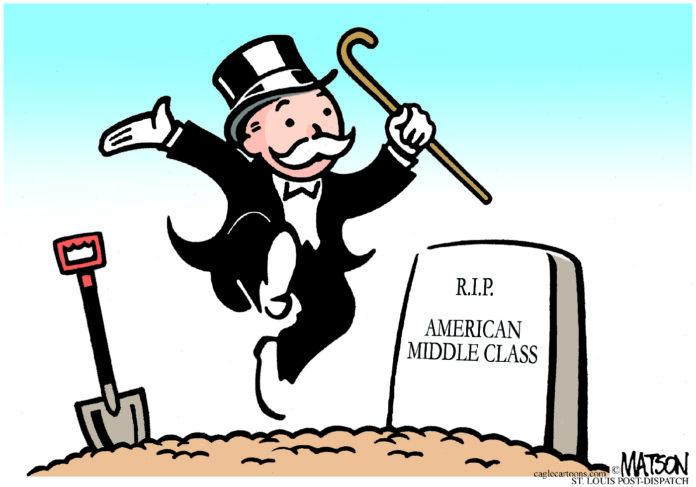BY DAVID PERRYMAN
 Milburn Pennybags possessed a most uncanny ability to accumulate wealth. As far as I know, he was never seen without his trademark red bowtie, grey trousers, spats, tailcoat and top hat, often puffing on the type of large cigar that connotes economic success.
Milburn Pennybags possessed a most uncanny ability to accumulate wealth. As far as I know, he was never seen without his trademark red bowtie, grey trousers, spats, tailcoat and top hat, often puffing on the type of large cigar that connotes economic success.
Milburn was sketched sometime around the Great Depression and gained fame as the stereotypical “Monopoly Man,” personifying wealth and the status of a financial baron whose “toil” had resulted in the accumulation of massive stockpiles of property and money. It is hardly an accident that Milburn Pennybags arrived during an era of unrestricted corporate expansion and growing economic inequality.
In 1929 the gap between rich and poor was egregious. The 200 largest companies controlled 50% of America’s corporate wealth. The wealthiest 1% of Americans had incomes that were 650 times greater than the poorest 10% in 1928.
The United States had experienced 30 years of relaxed financial regulation that gave corporations and investment houses the green light to expand and consolidate into “too-big-to fail” conglomerates. Doesn’t that sound familiar?
Earlier this year, a Dan Wasserman political cartoon in the Boston Globe graphically analyzed the situation.
According to Wasserman, the median annual compensation for CEO’s of large companies is $9.6 million. Based on that income, a CEO who takes four, one minute bathroom breaks per day makes four times as much per year standing at a urinal than a minimum wage worker makes in an entire year and, according to the author, that did not include any time for the CEO to wash his hands.
Similarly, Harvard’s Dr. Jeffrey Williamson and Dr. Peter Lindert of the University of California-Davis, using 2010 Census data, have determined that in 2010, the top 10% of wage earners in America received 47% of the income while the bottom 40% of wage earners receive less than 11% of the income.
Even more shocking is a report from the Drum Major Institute showing that in 2006, the ratio of the average U.S. CEO’s annual pay to minimum wage worker’s was 821:1, whereas in 1986 the ratio was 40:1.
As alarming as the income inequality is now and was just prior to the Great Depression, it has not always been that way.
Alexis de Tocqueville, the French aristocrat and historian who visited the United States in 1831, authored Democracy in America, perhaps the most frank and open critique of American life and politics ever written.
Tocqueville observed that, “Among the new objects that attracted my attention during my stay in the United States, none struck my eye more vividly than the equality of conditions. I discovered without difficulty the enormous influence that this primary fact exerts on the course of society; it gives a certain direction to public spirit, a certain turn to the laws, new maxims to those who govern, and particular habits to the governed.”
Today, in the absence of equality of conditions, is it any wonder that the public spirit suffers also?
For decades, our country had presented affordable educational opportunities to those young men and women who did not have access to family venture capital. In perhaps the greatest travesty of the 21st Century, college graduates are burdened with near insurmountable tuition debt.
Compounding the dire nature of our circumstance is the disparity between today and Tocqueville’s 1831 observation that, “In our day, one can say that in the United States the wealthy classes of society are almost entirely out of political affairs and that wealth, far from being a right [to power], is a real cause of disfavor and an obstacle to coming to power.”
Unfortunately, today, our political system begins and ends with money. Money is power and, according to information available at www.opensecrets.org, those who have it are not afraid to use it.
Having come a full 360 degrees, our government and our courts now recognize the “freedom of speech” of huge multi-national corporations and their ability to “speak” with political contributions.
According to an article by Jordan Weissmann in the Sept. 19, 2012 issue of the Atlantic, the income of the colonists was much more equal than our disparity today. In other words, the colonists had much more in common, economically, socially and politically than we do today.
Further, two historians concluded last year that, astoundingly, income inequality is worse today even than it was during the Roman Empire – and that included the income of slaves. The study found that the top 1% of Ancient Roman earners controlled 16% of the Empire’s riches, compared to the top 1% of American earners today who control 40% of our country’s wealth.
The hijacking of our democracy must be halted.
Tocqueville observed a people who were acting on a passion for liberty, equality and pursuit of the common good. Today, we observe special interests that bully; elected officials that cower; and a citizenry that has abdicated its responsibility.
Unless you and I find common ground, a shared concept of direction and the ability to compromise for the betterment of all, we will have no desire or will to reclaim what rightfully belongs to the American people.
Time is of the essence. Milburn Pennybags is not above the law.
Another recognizable character in the game of Monopoly is Officer Edgar Mallory, the policeman whose likeness appears on an orange colored “Chance” card dragging Pennybags “Directly to Jail,” probably for failing to pay a “Luxury Tax” or making an illegal campaign contribution.
– David Perryman, a Chickasha Democrat, represents District 56 in the Oklahoma House of Representatives








